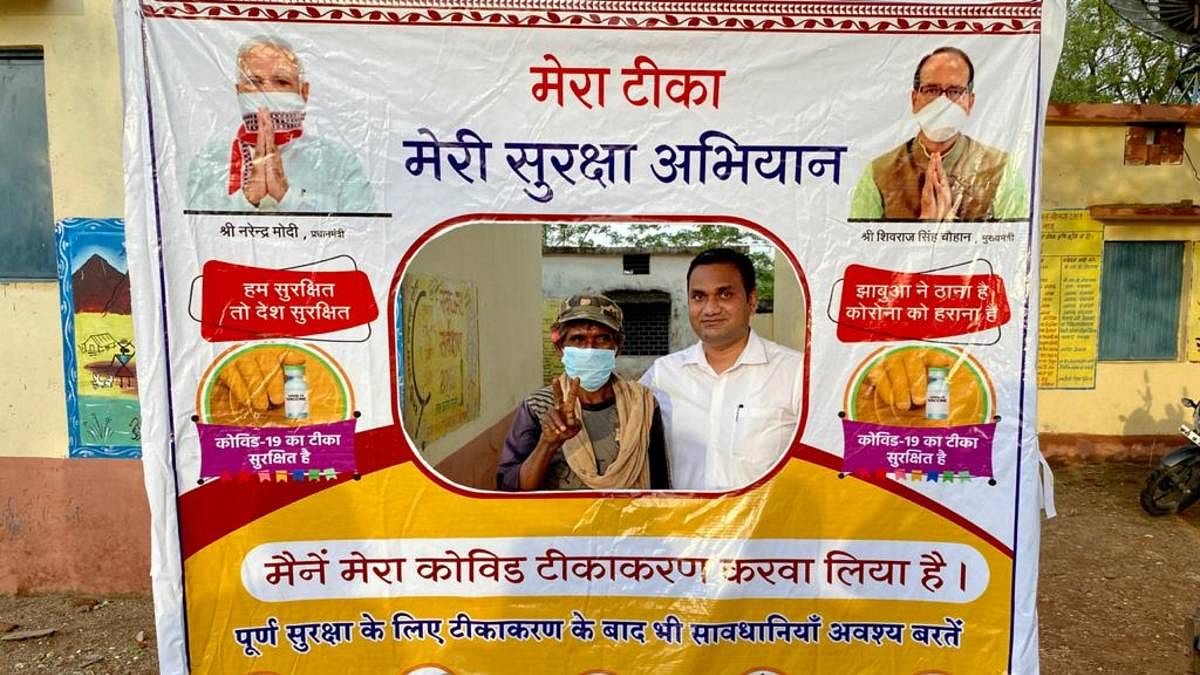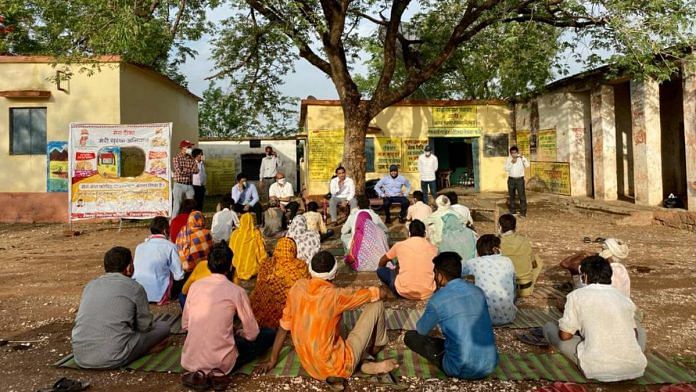Jhabua, Madhya Pradesh: “Vaccines are a government conspiracy”. “Vaccines lead to infertility”. “Vaccines are a ticking time bomb and whoever gets vaccinated will die in a matter of months”.
District officials and anganwadi workers in Madhya Pradesh’s tribal-dominated Jhabua district are used to hearing such things from residents, most of whom are daily wage labourers.
As the second Covid wave in the country peaked around April-May, district officials in Jhabua tried their best to get residents vaccinated. But were faced with a solid wall of prejudice.
Jhabua has reported a total of 7,683 Covid cases and 63 deaths till date, with no new cases reported in the last week.
“We would set up vaccination camps (in the villages), but hardly anyone would come, because of the rumours circulating about vaccines,” said Somesh Mishra, Jhabua’s District Magistrate.
That’s when the district officials decided to use the concept of ‘khatla baithaks’ to bust all myths being spread about vaccination.
“Khatla baithaks have been conducted in Jhabua for ages. In these informal meetings, village elders would sit with the residents and settle their disputes,” explained Akash Singh, sub-divisional magistrate (SDM) of Jhabua’s Meghnagar tehsil.
“We realised this would be the perfect medium to interact with the masses at an intimate level, and clear all their doubts.”
Translated literally, a ‘khatla baithak’ is a combination of a ‘khat’ or wooden bed, and ‘baithak’ meaning meeting.
Since early June, SDM Singh has addressed close to a dozen such meetings in gram panchayats across the district. The administration has also brought in tribal artistes to be a part of short videos to build vaccine awareness.
As a result, the district’s vaccination figures have also started improving. While in May, the district was reporting between 1,800 and 2,100 vaccinations every day, Mishra told ThePrint, that since the khatla baithaks started, Jhabua has been reporting around 4,000 vaccinations daily. On 24 June, the district broke all records and reported 10,000 vaccinations in one day.
On Sunday, 20 June, ThePrint accompanied Singh and his team to one such baithak in the district’s Gwali village. Word had spread, and the villagers turned up in full strength — and also brought along their misgivings about the ongoing vaccination drive.
Also read: Doctor operates on MP woman to remove tumour from brain. It turns out to be white fungus
Dispelling doubts at Khatla Baithaks
“How many of you have been vaccinated yet?” was Singh’s first question to the villagers gathered around the khat on which he was seated.
Only three people raised their hands, all anganwadi workers.
In a perfect play of ‘good cop-bad cop’, one of the anganwadi workers, Jineet Meda, complained to Singh that whenever she tried to convince the villagers to get vaccinated, all she got in return were brickbats.
“They say I am on the government payroll, so I am trying to get them vaccinated. They think vaccines will kill them or make them infertile,” added Meda.
In response, Singh pointed at himself, striking a tone of reassurance and empathy, rather than trying to preach the benefits of vaccination.
“Look at me, I am sitting in front of you. I received both doses of the vaccine, and so did all the other officials on this khat. We wouldn’t be alive and talking to you, if the rumours were true,” he said.

Over the next hour, he worked to dispel the doubts and fears surrounding vaccination. At times, he would provoke the villagers, to get them to open up. The aim was to have a frank, free-wheeling chat, rather than an official address.
“Will you get vaccinated? No? Why? Are you Shaktiman that the virus won’t kill you? This virus can even kill Shaktiman,” said Singh to a 20-something, sitting in the crowd.
At times, the villagers’ hesitancy or misgivings were cloaked in religious sentiments and Singh had to exercise tact while interacting with them.
“You are wearing an army cap (one with the camouflage print used in army uniforms), but are scared of vaccines. Why? Army men are so strong, they wouldn’t be scared of vaccines,” Singh questioned an old villager, wearing a peaked cap.
The villager, Riju Kumar, said that he lived his life “bhagwan bharose” (trusting in God to take care of things).
In response Singh said: “If you are standing on the road and a car comes speeding in your direction, you will step off the road, right? You won’t keep standing there. God would want you to move and save your life. A vaccine is just like that.”
At the end of this back-and-forth between the villagers and the district officials, Singh again asked the residents if they will get vaccinated. This time everyone raised their hands in consent.
Also read: Why Shivraj Singh Chouhan is under pressure in MP but likely not on his way out as CM
The rising numbers
District officials said the vaccination figures have improved consistently in villages where the khatla baithaks have been organised.
“The khatla baithaks have been instrumental in helping us reach out to the public, and improve vaccination numbers,” said Jaipal Singh Thakur, the Chief Medical Officer (CMO) of Jhabua.
In Mandli village, between March — when vaccination camps were first set up here — and 31 May, only 50 people came to be vaccinated. But once the khatla baithaks started, the number went up to over 270 by 15 June — more than 200 people got vaccinated in just two weeks.
Another Jhabua village, Gujarpara, had its first such khatla baithak on 2 June. Till then, only about 10 per cent of the vials sent daily to the village would be used. But the day after the baithak, on 3 June, the village saw 100 per cent vaccination success, with all vials that had been sent being used up.
As of 25 June, 1,20,000 people have received their first vaccine dose in the district that has a population of 7.5 lakh aged over 18 years.
“We have a long way to go, but khatla baithaks are helping us significantly improve the rate of vaccination,” said Thakur.

Jhabua officials have also brought in tribal artists to act in short movies aimed at building vaccination awareness.
“Watching these, and participating in the khatla baithaks have helped clear a lot of our doubts about vaccines,” Kirpal Singh, a resident of Jhabua, told ThePrint at one such movie screening.
(Edited by Poulomi Banerjee)
Also read: ‘We aren’t God, have basic needs, want protection’: Why 3,500 MP doctors resigned amid pandemic



